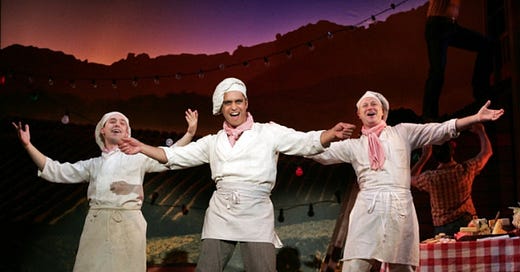Frank Loesser’s “Abbondanza,” performed in 2013 at the Goodspeed Opera House in East Haddam, Connecticut.
What better place than Substack to confess that every time I hear someone mention Ezra Klein and Derek Thompson’s new book Abundance, Frank Loesser’s exuberant song “Abbondanza” pops in to my head, from his 1956 Broadway musical The Most Happy Fella.
My parents were fans of The Most Happy Fella and used to play the record when I was growing up in New Rochelle. I associate the musical with politics because I saw the excellent 1992 revival when I was in New York City to watch Bill Clinton accept his party’s nomination at the Democratic National Convention. I was a reporter at the Wall Street Journal then, and less preoccupied that week with Clinton than with Ross Perot, whose campaign I was covering for the Journal. Ed Rollins, Perot’s co-campaign manager, gave me an interview saying Perot wouldn’t let him run a decent campaign, which, after my piece appeared in the Journal, prompted Rollins’ resignation and, a day or two later, Perot’s own withdrawal from the race (though Perot jumped back in one month before Election Day and snagged a remarkable 18.9 percent of the popular vote). For a political reporter, it was abbondanza indeed, and for my enterprise I was rewarded by being seated beside Journal editor Paul Steiger and Page One editor James Stewart during Clinton’s acceptance speech. But I digress.
Last week I published the first half of a two-part critique of the new supply-side liberalism books, of which the best-known is Klein and Thompson’s Abbondanza. (The other two are Yoni Appelbaum’s Stuck and Marc Dunkelman’s Why Nothing Works.) Part One was a critique of the books’ argument. Part Two is about what the books leave out. You can read this new entry here. There’s more to say, but I do not intend to write a part three because life is short and Donald Trump is president.
Speaking of which, if you failed to read my piece last week about how to resist Donald Trump’s attempt to create autocracy in America, I urge you to do so now, and to share it with any hand-wringing friends. That piece is here.





I agree more with this critique than yesterday's. The other version of this I've seen is that Klein and Thompson are too nice -- they pull a lot of punches, for fear of losing any element of the Dem coalition, including the folks who keep raising the ceiling on what counts of middle class, for purposes of pledges to "never raise taxes on anyone making less than $X".
I still think, though, that you are making a mistake here:
<quote>
“There is pressure among liberals,” Klein and Thompson write, “to focus only on the sins of the MAGA right.” Yes, at the moment that does seem to be kind of an emergency (and not just for liberals). “But this misses the contributions that liberal governance made to the rise of Trumpism.”
Sorry, I’m not buying it. All three of these books were written before the election; their argument would be more compelling had Kamala Harris won. A Harris presidency would have created more space for a conversation about small tweaks to liberal orthodoxies. Trump’s victory doesn’t leave us that luxury.
If Democrats are to win back the working-class majority necessary to regain the White House, they’ll need to talk about how a more activist government can address demand-side problems experienced by the proletariat.
</quote>
Democrats have tremendous power over supply-side issues in places like San Francisco, and California more broadly. The fact that working class people who work in San Francisco have to commute in from Merced is not only, or even primarily, because of Republican policies in DC. Far more blame lies with people like Aaron Peskin, who prioritizes the quality of views from Telegraph Hill over the amount of housing that could be built if the flats below the hill were allowed to build 6-7 story buildings.
You definitely can blame _past_ Republicans in CA, particularly Jarvis and Gann -- as the joke goes, California is governed by living Democrats and dead Republicans. But Abundance Dems are totally onboard for breaking those fetters as well. (And in fact our previous attempt to put a dent in Prop 13, the Prop 15 Split Roll initiative, narrowly failed because we got sandbagged by NIMBY Dems.)
But in any case, Democrats need to be able to go on the campaign trail and say, "Elect us, and we'll do for the country what we've done for California." Right now, with working class people fleeing the state, that reads like a bad joke. Instead _Republicans_ are telling voters, "Elect them, and they'll do to the country what they've done to California." And they're winning on that message! There is a lot to like about California, but until we turn it back into a welcoming place for people who want to move for economic opportunity, we're going to have serious problems in national elections. The changes to the electoral college map that are bearing down on us in 2030 are _horrifying_.
So why hasn't the increase in units meant availability on the low end? I know there are new buyers joining the market, many foreign, but some must be NYers migrating from less expensive housing. I also know the amortization schedule for improvements to units has been increased by a lot, which has motivated some owners to hold apartments off market, anticipating a return to better terms from Albany. Still it's baby economics (which is all I can understand) that more supply takes pressure off the market, so?